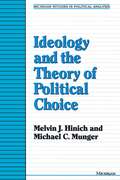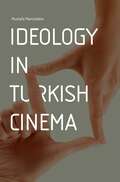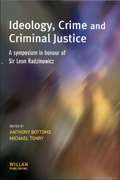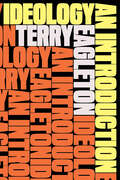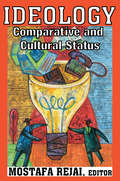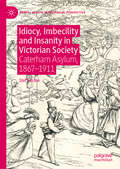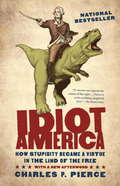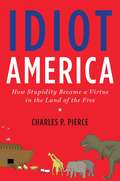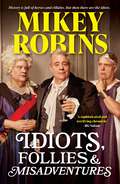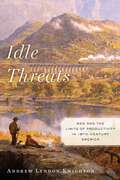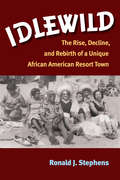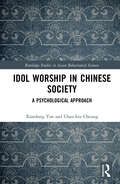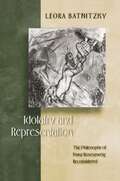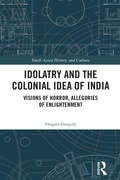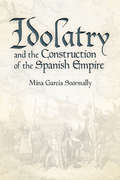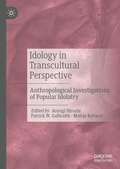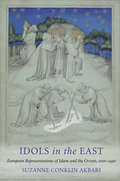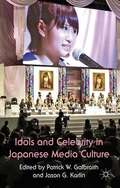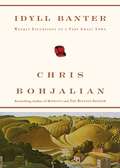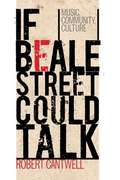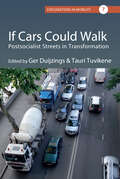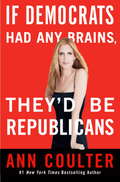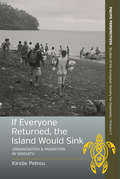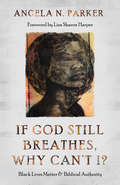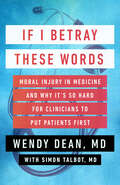- Table View
- List View
Ideology and the Theory of Political Choice
by Melvin J. Hinich Michael C. MungerThere is no unified theory that can explain both voter choice and where choices come from. Hinich and Munger fill that gap with their model of political communication based on ideology. Rather than beginning with voters and diffuse, atomistic preferences, Hinich and Munger explore why large groups of voters share preference profiles, why they consider themselves "liberals" or "conservatives. " The reasons, they argue, lie in the twin problems of communication and commitment that politicians face. Voters, overloaded with information, ignore specific platform positions. Parties and candidates therefore communicate through simple statements of goals, analogies, and by invoking political symbols. But politicians must also commit to pursuing the actions implied by these analogies and symbols. Commitment requires that ideologies be used consistently, particularly when it is not in the party's short-run interest. The model Hinich and Munger develop accounts for the choices of voters, the goals of politicians, and the interests of contributors. It is an important addition to political science and essential reading for all in that discipline. "Hinich and Munger's study of ideology and the theory of political choice is a pioneering effort to integrate ideology into formal political theory. It is a major step in directing attention toward the way in which ideology influences the nature of political choices. " --Douglass C. North ". . . represents a significant contribution to the literature on elections, voting behavior, and social choice. " --Policy Currents Melvin Hinich is Professor of Government, University of Texas. Michael C. Munger is Associate Professor of Political Science, University of North Carolina.
Ideology in Turkish Cinema
by Mustafa MencutekinMencutekin takes on the role of ideology in the history of Turkish cinema critically analyzing the values and ideas that have shaped the message and stories of Turkish movies. This study is based on the thesis that to truly explore the specific issues currently vexing Turkish cinema, one has to confront the aesthetic, technological, and ideological assumptions in the deeply nationalistic and secular approach to Turkish cinema and how they engage with the real social values of Turkish society. If one hopes to attain a cinema purified from all kinds of crisis, more democracy is required to create a cinema that is at peace with the past, present, and future of Turkish society.
Ideology, Crime and Criminal Justice (Cambridge Criminal Justice Series)
by Michael Tonry Anthony BottomsIn this book six leading criminologists address the central issues of ideology, crime and criminal justice in a series of essays originally presented at a symposium held in honour of Sir Leon Radzinowicz in Cambridge in March 2001. This book is concerned with the key themes of the history of criminal justice, the history and development of criminological thought, and criminal justice policy. Each of the contributed chapters makes an original and important contribution to the development of the discipline of criminology. This book is valuable reading for anybody interested in the past and present of the discipline of criminology, explored through essays on morality, prisons, policing, criminal justice and penal policy.
Ideology: An Introduction
by Terry EagletonIdeology has never before been so much in evidence as a fact, and so little understood as a concept, as it is today. In this now classic work, originally written for both students and for those already familiar with the debates around the concept, the celebrated literary theorist Terry Eagleton unravels its many definitions, exploring its tortuous history from the Enlightenment to the present.A limpid account of the thought of key Marxist thinkers, as well as that of philosophers from Schopenhauer and Nietzsche to Freud and the post-structuralists, and a political reformulation of a vital set of ideas, Ideology: An Introduction is an essential text by one of our most important contemporary critics.
Ideology: Comparative and Cultural Status (Controversy Ser.)
by Mostafa RejaiSince the early 1950s, the "decline of ideology" hypothesis has commanded a great deal of attention in the intellectual community at large. Th e controversy has taken both empirical and polemical turns. Th is book concentrates on the empirical literature, off ering both original contributions and previously published papers of outstanding importance. Selections were made to give full play to freshness of view and diversity of sources.The book presents the hypothesis of ideological decline as set forth by two of its major spokesmen, brings together essays that subject this hypothesis to empirical tests in both Western and non-Western contexts, and then presents both positive and negative evaluations of the hypothesis. Avoiding an ex cathedra definition of ideology, the editor and contributors scrutinize the nature of ideology and its workings and suggest approaches to the comparative treatment of ideologies.This book offers the first clear and wide-ranging overview of the putative decline of ideology, a concept burdened by a history of emotional argumentation. Changes in the function of ideology in the Soviet Union, the United States, Western Europe, and Japan are examined, and the ideological dimension of student movements of the 1960s is taken into account. Ideology: Comparative and Cultural Status is an expertly edited presentation of contrasting views of a vital topic. It is ideally suited for use in a variety of courses in the area of political thought and political sociology.
Idiocy, Imbecility and Insanity in Victorian Society: Caterham Asylum, 1867–1911 (Mental Health in Historical Perspective)
by Stef EastoeThis book explores the understudied history of the so-called ‘incurables’ in the Victorian period, the people identified as idiots, imbeciles and the weak-minded, as opposed to those thought to have curable conditions. It focuses on Caterham, England’s first state imbecile asylum, and analyses its founding, purpose, character, and most importantly, its residents, innovatively recreating the biographies of these people. Created to relieve pressure on London’s overcrowded workhouses, Caterham opened in September 1870. It was originally intended as a long-stay institution for the chronic and incurable insane paupers of the metropolis, more commonly referred to as idiots and imbeciles. This purpose instantly differentiates Caterham from the more familiar, and more researched, lunatic asylums, which were predicated on the notion of cure and restoration of the senses. Indeed Caterham, built following the welfare and sanitary reforms of the late 1860s, was an important feature of the Victorian institutional landscape, and it represented a shift in social, medical and political responsibility towards the care and management of idiot and imbecile paupers.
Idiot America
by Charles P. PierceThe Culture Wars Are Over and the Idiots Have Won. A veteran journalist's acidically funny, righteously angry lament about the glorification of ignorance in the United States. In the midst of a career-long quest to separate the smart from the pap, Charles Pierce had a defining moment at the Creation Museum in Kentucky, where he observed a dinosaur. Wearing a saddle. . . . But worse than this was when the proprietor exclaimed to a cheering crowd, "We are taking the dinosaurs back from the evolutionists!" He knew then and there it was time to try and salvage the Land of the Enlightened, buried somewhere in this new Home of the Uninformed. With his razor-sharp wit and erudite reasoning, Pierce delivers a gut-wrenching, side-splitting lament about the glorification of ignorance in the United States, and how a country founded on intellectual curiosity has somehow deteriorated into a nation of simpletons more apt to vote for an American Idol contestant than a presidential candidate. With Idiot America, Pierce's thunderous denunciation is also a secret call to action, as he hopes that somehow, being intelligent will stop being a stigma, and that pinheads will once again be pitied, not celebrated.
Idiot America: How Stupidity Became a Virtue in the Land of the Free
by Charles P. PierceThe Culture Wars Are Over and the Idiots Have Won. A veteran journalist's acetic, funny, righteously angry lament about the glorification of ignorance in the United States. In the midst of a career-long quest to separate the smart from the pap, Charles Pierce had a defining moment at the Creation Museum in Kentucky, where he observed a dinosaur. Wearing a saddle.... But worse than this was when the proprietor exclaimed to a cheering crowd, "We are taking the dinosaurs back from the evolutionists!" He knew then and there it was time to try and salvage the Land of the Enlightened, buried somewhere in this new Home of the Uninformed. With his razor-sharp wit and erudite reasoning, Pierce delivers a gut-wrenching, side-splitting lament about the glorification of ignorance in the United States, and how a country founded on intellectual curiosity has somehow deteriorated into a nation of simpletons more apt to vote for an American Idol contestant than a presidential candidate. With Idiot America, Pierce's thunderous denunciation is also a secret call to action, as he hopes that somehow, being intelligent will stop being a stigma, and that pinheads will once again be pitied, not celebrated.
Idiots, Follies and Misadventures
by Mikey RobinsThe history books are full of heroes and villains … but what about all the idiots? Comedian and armchair historian Mikey Robins tells the astonishing story of human stupidity, one idiot at a time.Two things are infinite: the universe and human stupidity, and I&’m not sure about the universe. Albert Einstein History is full of heroes and villains. But then there are the idiots. Idiots, Follies & Misadventures shows that human stupidity has always been our constant companion. History tends to omit tales of human fallibility. We overlook the dubious and ridiculous contributions made by history&’s tawdry parade of knuckleheads. But this book is a call to arms … knuckleheads assemble! And once assembled, prepare to be mocked. Just because history has mostly swept these idiots under the carpet does not make them by any means unsung heroes. These are rather ridiculous cautionary tales, to amuse and add some perspective to our current rash of stupidity. Tales such as: Why you shouldn&’t soak your underpants in mercury. The booze cruise that plunged England into civil war. The Russian nuclear briefcase and pizzas. Flatulence jars and The Great Plague of London. The deadly green wallpaper that proved a problem for Britain's trendy middle-class.
Idle Threats: Men and the Limits of Productivity in Nineteenth Century America (America and the Long 19th Century #15)
by Andrew Lyndon KnightonThe 19th century witnessed an explosion of writing about unproductivity, with the exploits of various idlers, loafers, and “gentlemen of refinement” capturing the imagination o fa country that was deeply ambivalent about its work ethic. Idle Threats documents this American obsession with unproductivity and its potentials, while offering an explanation of the profound significance of idle practices for literary and cultural production.While this fascination with unproductivity memorably defined literary characters from Rip Van Winkle to Bartleby to George Hurstwood, it also reverberated deeply through the entire culture, both as a seductive ideal and as a potentially corrosive threat to upright, industrious American men. Drawing on an impressive array of archival material and multifaceted literary and cultural sources, Idle Threats connects the question of unproductivity to other discourses concerning manhood, the value of art, the allure of the frontier, the usefulness of knowledge,the meaning of individuality, and the experience of time, space, and history. Andrew Lyndon Knighton offers a new way of thinking about the largely unacknowledged “productivity of the unproductive,” revealing the incalculable and sometimes surprising ways in which American modernity transformed the relationship between subjects and that which is most intimate to them: their own activity.
Idlewild: The Rise, Decline, And Rebirth Of A Unique African American Resort Town
by Ronald J. StephensIn 1912, white land developers founded Idlewild, an African American resort community in western Michigan. Over the following decades, the town became one of the country s foremost vacation destinations for the black middle class, during its peak drawing tens of thousands of visitors annually and hosting the era s premier entertainers, such as The Four Tops, Della Reese, Brook Benton, and George Kirby. With the civil rights movement and the resulting expansion of recreation options available to African Americans, Idlewild suffered a sharp social and economic decline, and by the early 1980s the town had become a struggling retirement community in the midst of financial and political crises. Meticulously researched and unearthing never-before-seen historical material, Ronald J. Stephens s book examines the rapid rise and decline of this pivotal landmark in African American and leisure history, in the process exploring intersections among race, class, tourism, entertainment, and historic preservation in the United States. Featuring a wealth of fieldwork on contemporary Idlewild, the book also takes a candid look at recent revitalization efforts and analyzes the possibilities for a future resurgence of this national treasure. "
Idol Worship in Chinese Society: A Psychological Approach (Routledge Studies in Asian Behavioural Sciences)
by Xiaodong Yue Chau-kiu CheungThis book introduces psychosocial studies of idol worship in Chinese societies. It reviews how idol worship is perceived in Chinese culture, history, and philosophy as well as how it differs from the concept of celebrity worship that is more dominant in Western literature. Using a pioneering hexagonal model of idol worship, this book explains how idol worship is affected by various demographic and dispositional variables as well as the cognitive and social functions of idols and idol worship. Finally, it discusses idol worship from a contemporary Chinese perspective, including emotional, interpersonal, and social learning aspects, and ends with a discussion of moral development perspective.
Idolatry and Representation: The Philosophy of Franz Rosenzweig Reconsidered
by Leora BatnitzkyAlthough Franz Rosenzweig is arguably the most important Jewish philosopher of the twentieth century, his thought remains little understood. Here, Leora Batnitzky argues that Rosenzweig's redirection of German-Jewish ethical monotheism anticipates and challenges contemporary trends in religious studies, ethics, philosophy, anthropology, theology, and biblical studies. This text, which captures the hermeneutical movement of Rosenzweig's corpus, is the first to consider the full import of the cultural criticism articulated in his writings on the modern meanings of art, language, ethics, and national identity. In the process, the book solves significant conundrums about Rosenzweig's relation to German idealism, to other major Jewish thinkers, to Jewish political life, and to Christianity, and brings Rosenzweig into conversation with key contemporary thinkers. Drawing on Rosenzweig's view that Judaism's ban on idolatry is the crucial intellectual and spiritual resource available to respond to the social implications of human finitude, Batnitzky interrogates idolatry as a modern possibility. Her analysis speaks not only to the question of Judaism's relationship to modernity (and vice versa), but also to the generic question of the present's relationship to the past--a subject of great importance to anyone contemplating the modern statuses of religious tradition, reason, science, and historical inquiry. By way of Rosenzweig, Batnitzky argues that contemporary philosophers and ethicists must relearn their approaches to religious traditions and texts to address today's central ethical problems.
Idolatry and the Colonial Idea of India: Visions of Horror, Allegories of Enlightenment (South Asian History and Culture)
by Swagato GangulyThis book explores literary and scholarly representations of India from the 18th to the early 20th centuries in South Asia and the West with idolatry as a point of entry. It charts the intellectual horizon within which the colonial idea of India was framed, tracing sources and genealogies which inform even contemporary descriptions of the subcontinent. Using idolatry as a concept-metaphor, the book traverses an ambitious path through the works of William Jones, James Mill, Friedrich Max Müller, John Ruskin, Alice Perrin, E. M. Forster, Rammohan Roy and Bankimchandra Chatterjee. It reveals how religion and paganism, history and literature, Oriental thought and Western metaphysics, and social reform and education were unfolded and debated by them. The author underlines how idolatry, irrationality and social disorder came to be linked by discourses informed by Enlightenment, missionary rhetoric and colonial reason. This book will appeal to scholars and researchers in history, anthropology, literature, culture studies, philosophy, religion, sociology and South Asian studies as well as anyone interested in colonial studies and histories of the Enlightenment.
Idolatry and the Construction of the Spanish Empire
by Mina García SoormallyAn ethnohistory on the spiritual and governmental conquest of the indigenous people in colonial Mexico, Idolatry and the Construction of the Spanish Empire examines the role played by the shifting concept of idolatry in the conquest of the Americas, as well as its relation to the subsequent construction of imperial power and hegemony. Contrasting readings of evangelization plays and chronicles from the Indies and legislation and literature produced in Spain, author Mina García Soormally places theoretical analysis of state formation in Colonial Latin America within the historical context. The conquest of America was presented, in its first instances, as a virtual extension of the Reconquista, which had taken place in Spain since 711, during which Spaniards fought to build an empire based in part on religious discrimination. The fight against the “heathens” (Moors and Jews) provided the experience and mindset to practice the repression of the other, making Spain a cultural laboratory that was transported across the Atlantic Ocean. Idolatry and the Construction of the Spanish Empire is a wide-ranging explication of religious orthodoxy and unorthodoxy during Spain’s medieval and early modern period as they relate to idolatry, with analysis of events that occurred on both sides of the Atlantic. The book contributes to the growing field of transatlantic studies and explores the redefinition that took place in Europe and in the colonies.
Idology in Transcultural Perspective: Anthropological Investigations of Popular Idolatry
by Patrick W. Galbraith Hiroshi Aoyagi Mateja KovacicThis edited volume expands on what Aoyagi Hiroshi intended in the first decade of the new millennium to establish as a subfield of symbolic anthropology called “idology.” It brings together case studies of popular idolatry in Japan, but goes further to provide a transcultural perspective to guide anthropological investigations in different places and times. In proposing an integrated paradigm for the growing body of literature on idols, the volume redirects recurrent questions to more fundamental points of sociocultural inquiry. Contributions from scholars conducting ethnographic fieldwork, as well as those engaged in theoretical and historical analyses, facilitate comparative reading and critical thought. Exceeding a narrow focus on human idols, the chapters shed new light on virtual idols and YouTubers, cartoon characters and voices, robot idols and cybernetic systems. Science and technology studies thus comes together with theories of animation and anthropological work on life in more-than-human worlds.
Idols In The East: European Representations of Islam and the Orient, 1100–1450
by Suzanne Conklin AkbariRepresentations of Muslims have never been more common in the Western imagination than they are today. Building on Orientalist stereotypes constructed over centuries, the figure of the wily Arab has given rise, at the dawn of the twenty-first century, to the "Islamist" terrorist. In Idols in the East, Suzanne Conklin Akbari explores the premodern background of some of the Orientalist types still pervasive in present-day depictions of Muslims-the irascible and irrational Arab, the religiously deviant Islamist-and about how these stereotypes developed over time. Idols in the East contributes to the recent surge of interest in European encounters with Islam and the Orient in the premodern world. Focusing on the medieval period, Akbari examines a broad range of texts including encyclopedias, maps, medical and astronomical treatises, chansons de geste, romances, and allegories to paint an unusually diverse portrait of medieval culture. Among the texts she considers are The Book of John Mandeville, The Song of Roland, Parzival, and Dante's Divine Comedy. From them she reveals how medieval writers and readers understood and explained the differences they saw between themselves and the Muslim other. Looking forward, Akbari also comes to terms with how these medieval conceptions fit with modern discussions of Orientalism, thus providing an important theoretical link to postcolonial and postimperial scholarship on later periods. Far reaching in its implications and balanced in its judgments, Idols in the East will be of great interest to not only scholars and students of the Middle Ages but also anyone interested in the roots of Orientalism and its tangled relationship to modern racism and anti-Semitism.
Idols and Celebrity in Japanese Media Culture
by Patrick W. Galbraith Jason G. KarlinThis is the most complete and compelling account of idols and celebrity in Japanese media culture to date. Engaging with the study of media, gender and celebrity, and sensitive to history and the contemporary scene, these interdisciplinary essays cover male and female idols, production and consumption, industrial structures and fan movements.
Idyll Banter: Weekly Excursions to a Very Small Town
by Chris BohjalianIn March 1986, while living in Brooklyn, Chris Bohjalian and his wife were cab-napped on a Saturday night and taken on a forty-five-minute joy ride in which the driver ignored all traffic lights and stop signs. Around midnight he deposited the young couple on a near-deserted street, where police officers were about to storm a crack house. Bohjalian and his wife were told to hit the ground for their own protection. While lying on the pavement, Bohjalian's wife suggested that perhaps it was time to move to New England. Months later they traded in their co-op in Brooklyn for a century-old Victorian house in Lincoln, Vermont (population 975), and Bohjalian began chronicling life in that town in a wide variety of magazine essays and in his newspaper column, "Idyll Banter. " These pieces, written weekly for twelve years and collected here for the first time, serve as a diary of both this writer's life and how America has been transformed in the last decade. Rich with idiosyncratic universals that come with being a parent, a child, and a spouse, Chris Bohjalian's personal observations are a reflection of our own common experience. "Chris Bohjalian is a terrific columnist—thoughtful and thought-provoking. Just like me! No, really, this guy is good. " —Dave Barry, author ofBoogers Are My Beat “The best book I’ve ever read about life in a contemporary village. There’s no doubt that Chris Bohjalian has established himself as one of America’s finest, most thoughtful, and most humane writers. ” —Howard Frank Mosher From the Hardcover edition.
If Beale Street Could Talk: Music, Community, Culture
by Robert CantwellDemonstrating the intimate connections among our public, political, and personal lives, these essays by Robert Cantwell explore the vernacular culture of everyday life. A keen and innovative observer of American culture, Cantwell casts a broad and penetrating intelligence over the cultural functioning of popular texts, artifacts, and performers, examining how cultural practices become performances and how performances become artifacts endowed with new meaning through the transformative acts of imagination. Cantwell's points of departure range from the visual and the literary--a photograph of Woody Guthrie, or a poem by John Keats--to major cultural exhibitions such as the World's Columbian Exposition. In all these domains, he unravels the implications for community and cultural life of a continual migration, transformation, and reformulation of cultural content.
If Cars Could Walk: Postsocialist Streets in Transformation (Explorations in Mobility #7)
by Ger Duijzings Tauri TuvikeneIn the last twenty-five years, the explosive rise of car mobility has transformed street life in postsocialist cities. Whereas previously the social fabric of these cities ran on socialist modes of mobility, they are now overtaken by a culture of privately owned cars. If Cars Could Walk uses ethnographic cases studies documenting these changes in terms of street interaction, vehicles used, and the parameters of speed, maneuverability, and cultural and symbolic values. The altered reality of people’s movements, replacing public transport, bicycles and other former ‘socialist’ modes of mobility with privatized mobility reflect an evolving political and cultural imagination, which in turn shapes their current political reality.
If Democrats had any Brains, They'd be Republicans
by Ann CoulterRight-wing provocateur Coulter clearly delights in angering liberals with outré statements that not infrequently demonize her political opponents as traitors, unleash anti-Arab and other forms of naked bigotry, wallow in fantasies of violence against real and perceived political enemies, and generally engage in a strange form of political performance art in lieu of argument. Here she collects numerous short examples collected from media appearances and her voluminous writings, including jokes about how all liberals hate Christianity, Senator Ted Kennedy's Chappaquiddick scandal, Islam as inherently violent, and the need to profile "swarthy males. " Those who enjoy Coulter's work will not find much new here, but may relive a mean-spirited chuckle or two. Anyone to the left of John Bolton, however, should probably just roll their eyes and ignore this book, unless they wish to aid Coulter's self-promotion of her own notoriety. Annotation ©2008 Book News, Inc. , Portland, OR (booknews. com)
If Everyone Returned, The Island Would Sink: Urbanisation and Migration in Vanuatu (Pacific Perspectives: Studies of the European Society for Oceanists #7)
by Kirstie PetrouFocusing on the small island of Paama, Vanuatu, and the capital, Port Vila, this book presents a rare and recent study of the ongoing significance of urbanisation and internal migration in the Global South. Based on longitudinal research undertaken in rural ‘home’ places, urban suburbs and informal settlements over thirty years, this book reveals the deep ambivalence of the outcome of migration, and argues that continuity in the fundamental organising principles of cultural life – in this case centred on kinship and an ‘island home’ – is significantly more important for urban and rural lives than the transformative impacts of migration and urbanisation.
If God Still Breathes, Why Can't I?: Black Lives Matter and Biblical Authority
by Angela N. ParkerA challenge to the doctrine of biblical inerrancy that calls into question how Christians are taught more about the way of Whiteness than the way of Jesus Angela Parker wasn&’t just trained to be a biblical scholar; she was trained to be a White male biblical scholar. She is neither White nor male. Dr. Parker&’s experience of being taught to forsake her embodied identity in order to contort herself into the stifling construct of Whiteness is common among American Christians, regardless of their race, ethnicity, gender, or sexual orientation. This book calls the power structure behind this experience what it is: White supremacist authoritarianism. Drawing from her perspective as a Womanist New Testament scholar, Dr. Parker describes how she learned to deconstruct one of White Christianity&’s most pernicious lies: the conflation of biblical authority with the doctrines of inerrancy and infallibility. As Dr. Parker shows, these doctrines are less about the text of the Bible itself and more about the arbiters of its interpretation—historically, White males in positions of power who have used Scripture to justify control over marginalized groups. This oppressive use of the Bible has been suffocating. To learn to breathe again, Dr. Parker says, we must &“let God breathe in us.&” We must read the Bible as authoritative, but not authoritarian. We must become conscious of the particularity of our identities, as we also become conscious of the particular identities of the biblical authors from whom we draw inspiration. And we must trust and remember that as long as God still breathes, we can too.
If I Betray These Words: Moral Injury in Medicine and Why It's So Hard for Clinicians to Put Patients First
by Wendy Dean Simon TalbotAn incredibly important and captivating book for patients, families, and clinicians detailing how we&’re all hurt by corporate medicine&“Wendy Dean diagnoses the dangerous state of our healthcare system, illustrating the thumbscrews applied to medical professionals by their corporate overlords… Required reading for all stakeholders in healthcare.&” — Danielle Ofri, MD, PhD, author of When We Do Harm: A Doctor Confronts Medical ErrorOffering examples of how to make medicine better for the healers and those they serve, If I Betray These Words profiles clinicians across the country who are tough, resourceful, and resilient, but feel trapped between the patient-first values of their Hippocratic oath and the business imperatives of a broken healthcare system.Doctors face real risks when they stand up for their patients and their oath; they may lose their license, their livelihood, and for some, even their lives.There&’s a growing sense, referred to as moral injury, that doctors have their hands tied – they know what patients need but can&’t get it for them because of constraints imposed by healthcare systems run like big businesses.Workforce distress in healthcare—moral injury—was a crisis long before the COVID-19 pandemic, but COVID highlighted the vulnerabilities in our healthcare systems and made it impossible to ignore the distress, with 1 in 5 American healthcare workers leaving the profession since 2020, and up to 47% of U.S. healthcare workers now planning to leave their positions by 2025.If I Betray These Words confronts the threat and broken promises of moral injury – what it is; where it comes from; how it manifests; and who&’s fighting back against it. We need better healthcare—for patients and for the workforce. It&’s time to act.
